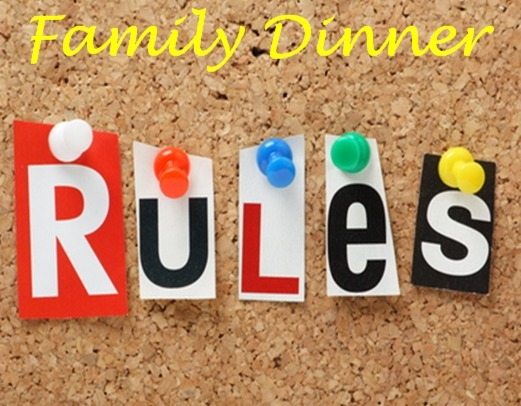You go the trouble of making a balanced dinner only to be met with resistance from your children. The answer is not to choose between the lesser of two evils: making kids eat or cooking an alternative meal. All you need to solve this problem is to institute and enforce some very simple rules. These family dinner rules help mealtime run smoothly while setting clear limits.
1. You don't have to eat (but please join us at the table for family time)
Ellyn Satter's Division of Responsibility is the key to avoiding most feeding challenges. If you haven't heard of it, this is the feeding philosophy supported by most major health organizations like the AAP. It comes down to this: parents and kids are responsible for two very different jobs in the feeding realm. The parents job is to choose the meals, when they will be eaten and where. The kid gets to decide whether to not to eat it.
Kids often need to be reminded of this when they whine about the dinner choice (see rule 4 below). In short, kids need to know that while they don't have to eat, their presence at the table is non-negotiable.
2. There will always be something at the table you like
When a child comes to the table and sees a bunch of unfamiliar food it can cause them to panic. I always tell my kids there will always be something on the table they prefer. This helps for other reasons too. Parents often complain that their kids say they are full, when in reality they didn't like the meal. Then, an hour later they are asking for snacks. Having something they can fill up on avoids this very common problem.
You may worry that your child will never expand his horizons, but he will. After a while children tire of even of their favorite foods, appetites increase and minds become less resistant. Continual exposure and offering with a safety net allows kids to expand at a pace that is right for them.
3. Helpers are appreciated! You will be assigned one small job before dinner
Having kids help in the kitchen is good for a variety of reasons from learning cooking skills to getting food exposure to easing parents' workload. But I find that posing the question "Do you want to help make X?" rarely piques my kids' interest. So I've started assigning small jobs. Sometimes this is cooking or prep related and other times it's just setting the table.
4. No food complaining allowed, please
I don't allow complaining about the food like "not this again!" This also includes saying negative things about any particular food item like "gross" or "yucky." This rule is in place out of respect for the cook and others who do enjoy the food. I encourage my kids to simply say "no thank you."
Don't let complaining turn the atmosphere negative. I simply remind my kids of the rule and empathize: "It sounds like your disappointed with the meal choice. Remember, no complaining, it's disrespectful to the cook." If the complaining is becoming more frequent, I bring them into meal planning.
5. No throwing food but you can touch, smell and lick any part of your meal
This one is geared towards toddlers who begin to throw food as they learn cause and effect: "If I throw my meatball, it hits the ground and mom yells!"
It's important that children learn food throwing is not acceptable. But touching and getting to know your food should be, as it helps children learn about the food's properties. Even with a 6- and 9-year-old, I encourage them to gather as much information about a food as they can, and touching and smelling is always the first step.
6. When you're done eating, that's it until breakfast, so make sure you fill your belly
After dinner is done, and sometimes dessert (with or after the meal), eating is also done. My kids understand this and pretty much never ask for food after dinner. Some very young kids may need a nighttime snack or milk before bed but as kids get older this is usually phased out. You don't want children holding out for after-dinner eats.
7. When you're done eating, bring your plate up to the sink
With summer and looser schedules, I've been focusing on encouraging the kids to help out as much as possible. It's easy for them to bring their plate up to the sink and it also signals the meal is done. And if they want to clear more plates, by all means, let them.
An expansion of these rules and other tips and recipes for cooking (and eating) with children is detailed in my newly released book: What to Cook for Dinner with Kids.
This post originally appeared on Maryann's blog, Raise Healthy Eaters.
